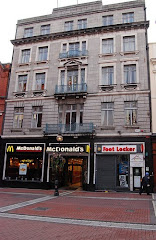One passage that caught my attention is on 391 in which Joyce describes the place setting and food on the table in great detail. He makes the amount of life in the room clear, be it through laughter, color, and varying emotions of the people there. He mentions, for instance, the “two little ministers of jelly, red and yellow”, “bunches of purple raisins”, “chocolates and sweets in gold and silver papers” and “pudding in a huge yellow dish”. This description of a joyous feast almost chaotic with details is followed by one discussing the diners themselves. They, too, are shown to be drenched in both happiness and chaos, the room thick with “a great deal of confusion and laughter and noise” (392). This lively passage, however, takes on a different tone when the guests reflect nostalgically on their favorite opera singers and wonder “why they never play the grand old operas now” (394). What was once a party celebrating life through colors and emotions is now nostalgia, the focus shifting to something from the past instead of their present cheer.
I think Joyce put these tones next to each other in the passage to comment on the natural tendency to focus on the past. The guests, after all, are surrounded by life and vivacity but still end up dwelling on unobtainable memories. This idea of living in the past instead of the present, or through the dead instead of the living, is everywhere in the story. The characters mourn past performers, a dead horse, a dead lover, and, for Gabriel, even country dead to him. Not even the colors of the food and the jubilance of the conversation are enough to keep the guests from nostalgia. Like Gabriel, who is torn between the old hospitality of Ireland and its present state, the guests are unable to escape from the dead.
Friday, January 15, 2010
Subscribe to:
Post Comments (Atom)

I totally agree here and if you notice, though this is a story focused around the characters, we never get character development because that means we would get characters looking to their future. Joyce tells the reader more about each characters past this way. This is similar to the poem, Bogland, as well. Joyce overall point is that Ireland maybe focuses to much on the past and never looks to the future.
ReplyDelete